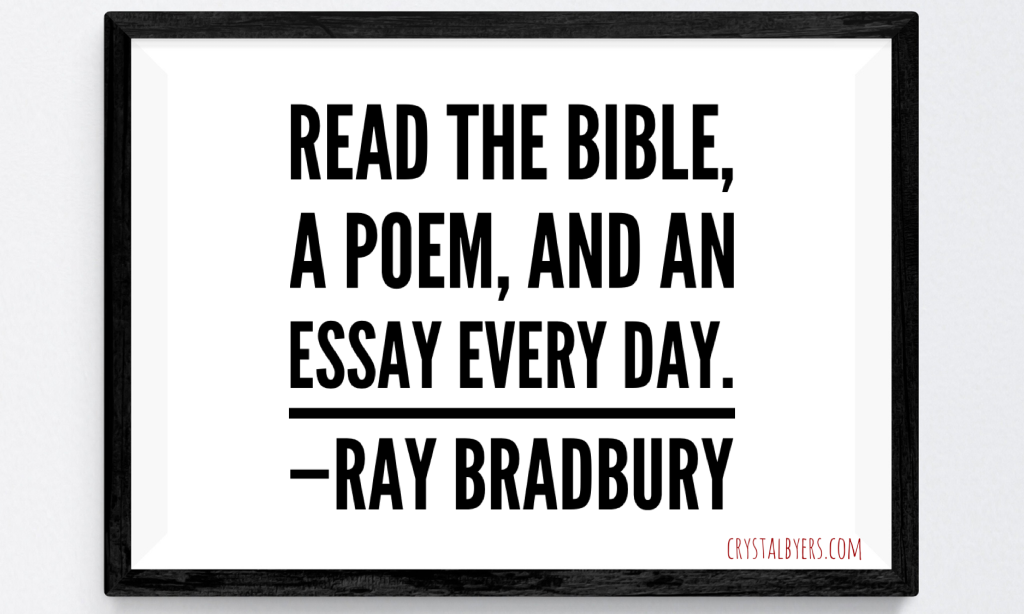Earlier this June I scrolled into a WordPress post called “Advice from Ray Bradbury.” I love Bradbury, I said to myself as I clicked the link.

In response to a post about favorite rereads by Ally Bean, E. A. Wickham pulled Zen in the Art of Writing from a bookshelf and opened the cover. There was Bradbury’s dated signature. She had seen him speak three times and bumped into him once at a Mexican restaurant. She relayed a piece of writing advice that stuck with me. Ray Bradbury said, “Read the Bible, a poem, and an essay every day.”
I ordered the book online and promptly drove north before it arrived. For the next week, I relished a family jackpot of quality time, cooler temperatures, and Dad on Father’s Day. Eventually I arrived home to my Amazon package containing Zen in the Art of Writing, a book of essays on creativity. I opened the cover. Gems abounded.
And what, you ask, does writing teach us?
First and foremost, it reminds us that we are alive and that is a gift and a privilege, not a right…
Secondly, writing is survival. Any art, any good work, of course, is that.
Not to write, for many of us, is to die.
Ray Bradbury
Bradbury wrote about making lists of titles, long lines of nouns that caused his better stuff to surface. He wrote about running through those lists, picking a noun, and sitting down to write a long prose-poem-essay on it. That was all by page twelve.
In the next chapter, he said, “Read poetry every day of your life,” and went on to tout essays, short stories, and novels as muses. He wrote about word-association games played between head and heart. Nothing about the Bible yet, but still the advice remains in the back of my mind.
So I picked up The Norton Introduction to Literature and found the poetry section. It begins with “The New Colossus” by Emma Lazarus and definitions on poetry from Merriam-Webster and The Oxford English Dictionary, followed by Lydia Davis’s “Head, Heart.”
Head, Heart
Heart weeps.
Head tries to help heart.
Head tells heart how it is, again:
You will lose the ones you love. They will all go. But even the earth will go, someday.
Heart feels better, then.
But the words of head do not remain long in the ears of heart.
Heart is so new to this.
I want them back, says heart.
Head is all heart has.
Help, head. Help heart.
And so I’ve been reading Ray Bradbury’s essays, poetry from an anthology, short stories by Alice Munro, and…
I have an amazing study Bible. I admit, I haven’t studied much, but Ray Bradbury said, “Read the Bible, a poem, and an essay every day.” So, each morning for the past few days, I’ve flipped to the book of Job to read a chapter or two. I had been thinking of him for months now, a man of perfect integrity who lost practically everything. Who would’ve thought Ray Bradbury would’ve lead me to scripture? How often do my own head and heart battle?
My Life Essentials Study Bible was written by my former pastor Gene Getz, a renowned Bible teacher, an avid writer, a college and seminary professor. He is super smart, and no matter your spiritual beliefs, he explains the text with a simplified, relatable, common-sense approach. The entire Bible is filled with QR codes linking to videos of Gene’s teaching and principles to live by.
Principle #1 We should use God’s spiritual resources so we can be victorious over Satan’s evil schemes.
Principal #2 When ministering to those who are suffering, we should initially focus our efforts on simply being present, not on dispensing information.
Principal #3 We should allow people who are deep in pain to ask “why” questions without being too quick to offer answers.
Bear with me. A few years ago when I became an official writing student, my class once dove into the the opening sentence of Isak Dinesen’s Out of Africa:
I had a farm in Africa, at the foot of the Ngong hills.
Isak Dinesen (AKA Karen Blixen)
Class discussed. I took notes:
The first six words of the novel are iambic, and the “had” emphasizes the past tense conflict. The narrator no longer has the farm. The prepositional phrases, “in Africa at the foot of the Ngong Hills,” reveal a general location—Africa—and a specific location—the Ngong Hills. The repeating anapestic rhythm connects the music of language and beauty of landscape. In this simple sentence, there are only two polysyllabic words. The rest are monosyllabic, which slow you down and lend a sense of gravity. It’s almost Biblical. “The Lord is my shepherd. I shall not want.”
Biblical verses are memorable and recitable due to rhythmic phrasing. Just like poetry. And Bradbury, with his writing advice, is clearly onto something.
